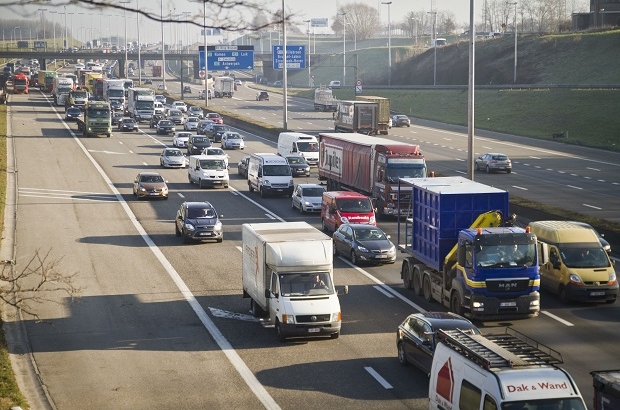- Daily & Weekly newsletters
- Buy & download The Bulletin
- Comment on our articles
Jette to appeal against Flemish plans to widen Brussels ring road
Plans to add an additional lane to the Brussels ring road in Wemmel could run into difficulty now that the municipality of Jette is refusing to approve the motorway’s expansion.
The Brussels neighbourhood is concerned that an extra lane could cause an increase in traffic and pollution, especially in the residential area around UZ Brussels, Bruzz reports.
The Belgian capital already struggles to manage air pollution, particularly from heavy vehicle traffic. Even if Brussels residents curtail their car use or stop using motor vehicles altogether, commuters from Flanders and Wallonia continue to contribute a substantial amount of emissions.
The Flemish government communicated a plan to expand the highway into Brussels in mid-July. It includes adding an additional lane while closing exit 8 to Wemmel, redirecting traffic to exit 9 at Jette, which will become a full entrance/exit ramp.
Flanders says it would “optimise” traffic flow and that simulations show heavy traffic will pass through residential areas less often. But Jette fears the opposite will occur.
“We repeat what we have been saying for 10 years: we are against the widening of the ring road in Jette and against a traffic junction that would end up in a neighbourhood with 4,000 inhabitants and several schools and crèches,” said Mayor Claire Vandevivere (LB-CDH).
“For 10 years we have had the feeling that we are not being listened to. If an urban development permit is submitted, we will reject it. We will also consult with the Brussels government and if necessary, we will go to the Council of State.”
Competing studies show pros and cons
Jette has its own studies to bolster its claims that traffic will increase. “Flanders may well be boasting about extra cycle paths and better public transport between Brussels and the outskirts, but that’s a measure of nothing if you are widening the ring road at the same time,” said alderman for Mobility Nathalie De Swaef (Groen).
“That gives the signal to motorists that they are getting it easier.”
Brussels' major mobility plan, Good Move, has sought to reduce the amount of vehicle traffic in the capital, which is higher than that of other major European cities, along with emissions.
But Flanders says that rather than the expansion causing more cars to pour into Jette, the opposite will occur: cars from Jette will move onto the ring road, reducing traffic within Brussels.
“The traffic jams on the ring road are also caused by local traffic. We want to suck in that traffic, but not create new traffic. That’s why we are investing in alternatives,” said spokesperson Marijn Struyf of De Werkvennootschap.
Jette isn’t convinced by Flemish simulations, which don’t address emissions concerns.
“By closing exit 8, more cars will converge, which means more air pollution,” said mayor Vandevivere. “This remains a project that runs counter to sustainable mobility, the environment and the health of Jette residents.”
Public opinion divided
In a petition that Jette organised among its citizens last year, more than 6,000 people joined in opposing the Flemish plans. But opinions are still divided.
“Many local residents did not sign the petition because the municipality is mixing two issues,” said a member of one neighbourhood committee.
“They are against the closure of exit 8 and the new exit on Dikke Beuklaan, but not against the construction on the Ring as a whole. The fact that there will be more cycle paths and public transport is just fine by them.”
The UZ Brussel is not opposed to the plan entirely, either.
“We understand the concerns of the municipality very well, but as a hospital we do think it’s important that exit 9 is opened up,” environment and mobility coordinator Nico Van Elzen told Bruzz.
Van Elzen pointed out the difficulties some local patients have in reaching the hospital without taking detours.
With the current plans not yet finalised, it’s now up to the ministers of mobility from Flanders and Brussels to reach a political agreement on the next steps.
For Brussels, minister Elke Van den Brandt (Groen) has already expressed disapproval. Further consultation is planned after the summer.
Photo: © Belga/Aurore Belot














